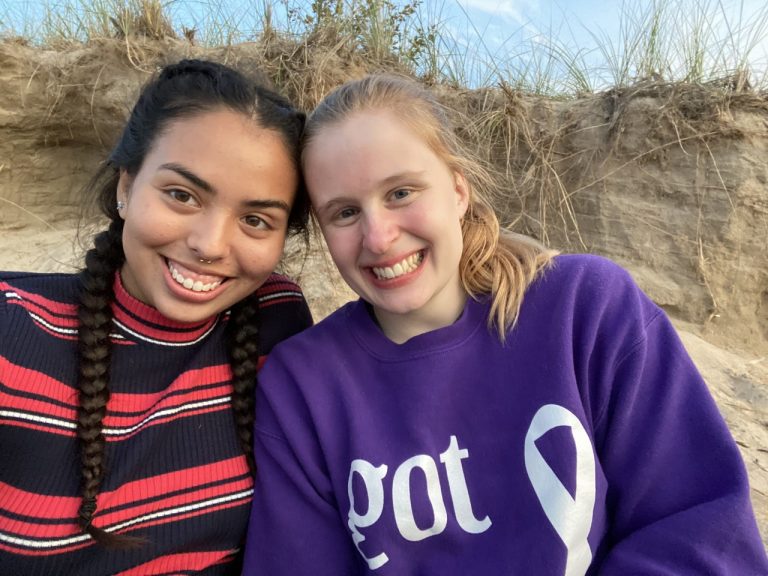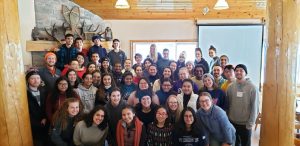
Tell us about yourselves:
Natalie: My name is Natalie, I’m in Industrial Engineering. I started in Track One, and I decided to go into IndE. Right now I’m finishing my second year in Industrial Engineering but I’m actually in my third year at U of T. I did my second year in part-time engineering because I wanted to do some classes in Arts and Sciences. I’m trying to minor in Latin American studies and Indigenous studies. I’m from Toronto and have grown up here most of my life, other than that I also grew up in Ecuador because that’s where half of my heritage is from. I’m co-president this year and I’ve been involved with Engineers Without Borders (EWB) since my first year.
Lauren: My name is Lauren I’m in third year of Engineering Science in the Energy Systems option and I’m minoring in Environmental Engineering. I’m from just outside of Chicago but half of my family is from Canada in Toronto which is what motivated me to come here. I’m also co-president of EWB and have been involved since my first year.
How did you both get involved with EWB?
Lauren: I got involved in my first year in the Policy and Advocacy portfolio. We have six different portfolios in EWB right now and they vary year to year but Policy and Advocacy is still one we have now. I was interested in more of the social impact side of engineering. So that portfolio gave me the chance to participate in a petition campaign to promote the UN sustainability development goals. We also got to host events for International Women’s Day and I liked being able to work on different awareness projects while still learning about technical content. EWB was a place for me to get a balance from the technical content of school. In second year, I was in the Local Poverty Alleviation portfolio, and also an exec in VP Mentorship (now called VP Community), which is a position to help the community become more tightly knit. I really liked both those experiences, I really liked being in the club, the community and all the people I met, so I really wanted to run for president at the end of my second year.
Natalie: When I started at U of T, I knew I wanted to join a club right a way. As I was browsing the clubs in engineering, EWB is the one that spoke to be first because I’ve always been interested in social impact. I got involved and joined the Indigenous Reconciliation portfolio because it is one of my interests. It kind of exceeded my expectations in terms of how many opportunities there are to get involved because it’s such a big club, there’s something for everyone.
I was part of Indigenous Reconciliation and through that portfolio I actually went to Nunavut. I went to Iqaluit with some of the other members in the portfolio in first year. That was a really exciting opportunity and after first year I did a program with EWB Canada called the Junior Fellowship. Through that program I did an internship, I worked for a social enterprise in Uganda for four months. They were doing acceleration for local agribusinesses there and I was in a marketing role. In second year I decided to apply for the exec team and I became the VP of learning, which is one of our core values at EWB. We always try to have opportunities for people to learn about social impact. One thing I’m really passionate about is doing my own research and sharing it, so I loved that position. Running for president was a bit of a natural progression for me as I’ve always been really super involved with the club. I hadn’t always considered doing it but I got inspired when it was time to run.
What does EWB do?
Natalie: EWB is a social impact club and at its core it’s looking to create leaders who are critical thinkers and have a basis of understanding systemic change. In particular, we target engineering students and students in technically focussed STEM fields, in order to compliment their technical studies with an understanding of social impact. I think what people get out of EWB is being able to challenge the status quo. Especially within technical realms and ask the question, if I’m working for social impact or in a mission driven organization, how can I know a technical solution is the best solution? And be comfortable with that. I think that’s what’s interesting about EWB, we really want people to be challenging the way that they think about the world.
What does a typical year on EWB look like?
Lauren: When people join the club they can join as a general member, get a feel for it and not be attached to a portfolio. But usually after a certain point, at least most people will filter into at least one portfolio, some are in multiple. It’s whatever portfolio interests them, and it’s up to the initiative they take to get involved in that portfolio. Each portfolio works on certain projects and those projects almost always have room for more people to work on them, but it’s up to you to insert yourself into them and take on that work.
In terms of the actual trips and especially in the past two years, our trips have taken more of a local focus. The junior fellowship program EWB Canada runs, which sends a fellow to Africa, is something our club has not done in the same capacity because of COVID but also because of our changing relationship with EWB Canada. It’s also that’s an opportunity that’s only available for one to two students anyway. For the most part, people in our club participate by being part of a portfolio that is working locally. There may be the occasional extra opportunity you can sign up for but it’s less common.

EWB Chapter-run Student Leaders’ Summit in Muskoka, January 2019.
What are the six portfolios students can get involved with at EWB?
Lauren: Indigenous Reconciliation, Local Poverty Alleviation, Policy and Advocacy, Sustainability and Environmental Justice, Cyber Ethics/Digital Rights and Youth Engagement.
Can you tell us about your experience on trips?
Natalie: The trip I went on to Uganda was pretty life changing. While I was there I was working with a social enterprise and they ran a program to accelerate agri-businesses in the area. I ran the marketing side of that. So I would get the marketing materials ready to market to both prospective entrepreneurs as well as partners and other people who can support it because a social enterprise does need to make money but it’s not necessarily looking to make a lot of profit. What was cool about the junior fellowship is you get work experience and you also get to understand how the work culture in another place is different from the work culture you’re used to. I had never worked outside of Canada before but I also got an opportunity to travel and see the county as well as surrounding countries.
I think the most important part of that experience was the people I was travelling with. There were about eight other people with me in Uganda, but in the program in total there were 15 from other universities across Canada. They’re still some of my best friends now, I still keep in contact with a lot of them. They share a lot of similar values to me and are like minded so sharing that experience with them is what made it such a great opportunity.
The trip I did in Nunavut was not affiliated with my EWB, it’s something I found out about through my involvement working on the portfolio. But the point there is that portfolios connect you to opportunities but not necessarily everyone who joins a portfolio will go on a trip. In terms of a trip I took to Uganda, it’s not something that’s happening in the same capacity. Not just in our chapter but in the organization, this year they restructured the program so it doesn’t look the same as it did in the past. Most people who join EWB don’t go on a trip it’s kind of rare and especially right now because of COVID and other reasons, it’s really not at all the main focus.
What has the EWB been up to now that everything is virtual?
Lauren: Luckily since we’re not a building focussed tech design team. We aren’t struggling too much with not having the ability to meet in person and build so we’ve been able to adapt a lot of our events to online settings. All six of our portfolios are still running, pretty much in full capacity. They’re still able to run through Zoom. There are regular learning events, project meetings and weekly or monthly portfolio meetings. So lots of meetings happening in the club still.
Our policy advocacy portfolio is in the middle of creating a podcast, the first episode is about to be released. The starting up projects are in the research phase and are able to do that just as well. We also have more established projects, like the Local Poverty Alleviation portfolio is working on a food bank that’s stepped in and become the main food bank for U of T. The UTSU food bank closed during the start of COVID, so the food bank our club is working on has grown and expanded a lot. They’re working really hard on keep donations coming in so they can still keep supplying food to students in need. We still have a lot of the same sense of community. Now more than ever, it’s really on the individuals who want to get involved to get involved. It’s a lot easier for people to fall through the cracks online. For those who are taking the initiative to join different portfolios, projects and meetings, they are still able to participate pretty fully in an online setting.
What is the best way for someone to get involved with EWB?
Natalie: The best way to get involved is registering with a membership form but to get access to that link you’ll have to get in contact with us. Send us an email, let us know you want to get involved, we’ll send you a membership form and once you complete that you’ll get access to our Slack board space which is our main hub. On the Slack board space you get access to all the portfolio channels, where they tell you about their events, weekly meetings, projects and if they’re looking for people to increase the capacity of their teams. Once you’re on our Slack you’re set, you just have to make sure to check it. But reach out to people if you want to get involved and learn more about a specific project or portfolio.
Anything to add?
Lauren: We are open to everyone, beyond engineers. We really like having people from Arts and Science to join as well and create an environment where our projects are super interdisciplinary. The Eng and STEM students can learn from Arts and Science and vice versa.
For more information about Engineers Without Borders: University of Toronto Chapter please visit https://utoronto.ewb.ca
– This story was originally published by Rebecca Logan on the Department of Civil & Mineral Engineering News site on January 22, 2021